Overview
The President’s Award for Outstanding Contributions to Teaching & Learning is the highest honour for teaching excellence at McMaster University. Each President’s Award for Outstanding Contributions to Teaching and Learning recognizes the sustained contributions of an individual or group to education through innovation, continued excellence in teaching, and enhanced student learning. It is an award that recognizes sustained and effective achievement with weight given to evidence of continuing effort and outstanding contributions over at least five years.
Outstanding contributions to teaching and learning may be demonstrated by evidence of the intellectual growth of students that results from innovative teaching in the classroom, the mentorship of students through involvement in research or practical experience, the development of novel and effective educational materials, or forms of educational leadership that promote teaching and learning within and beyond McMaster. Outstanding educators should also hone their expertise through professional learning and development.
Recipients of the President’s Award for Outstanding Contributions to Teaching and Learning receive:
- A citation of excellence and certificate to be presented at Spring Convocation;
- An honorarium in the amount of $3,000;
- An inscription of the recipient’s name on a permanent plaque bearing names of all previous award recipients;
- An invitation to the annual President’s Retreat;
- Membership in McMaster’s community of award-winning educators.
Each year, the number of awards may fluctuate depending on the pool of applicants. In previous years, 1-8 awards have been bestowed.
If you know an outstanding educator who ensures students have positive and effective learning experiences, please consider nominating them for this award. To nominate an educator, the following steps must be taken:
- Nomination Brief and Abridged CV
Nominators must draft and submit a 2-page nomination brief attesting to the nominee’s quality of teaching and impact on student learning. Nomination briefs are typically submitted by a nominee’s respective Chair or Dean but can be proposed by members of faculty, students, and/or staff.
The nomination brief should be accompanied by an abridged CV for the nominee, which should include only activities and content relating to teaching and learning.
These documents must be submitted in a single PDF file to the Office of the Vice-Provost, Teaching and Learning by 31 October 2025, 11:59 p.m.
- Awards Nomination Portfolio
A shortlist of nominees will be approved by early December to advance to Stage 2. These nominees will develop a 25- to 35-page awards portfolio, with support from the MacPherson Institute.
The Nomination Portfolio must be submitted in a single PDF file to the Office of the Vice-Provost, Teaching and Learning by 27 February 2026, 11:59 p.m.
Award Procedure
All current full-time and part-time faculty and staff (including those who are on contract) who contribute to teaching and learning at McMaster are eligible.
A previous recipient remains eligible, but only based on work completed since the previous award. The nominee and nominator must reference the previous award and clearly identify how the work included in the new portfolio differs from previous work already recognized through this award.
Senior administration (i.e. Associate Deans, Deans) are not eligible to apply for the award while they hold their positions but are encouraged to support and nominate outstanding faculty for the President’s Award. In exceptional circumstances, chairs and directors may be nominated, but must demonstrate outstanding contributions to teaching and learning beyond their regular responsibilities as chair or director.
Please consult the Nomination Portfolio Guide for more information about creating the full nomination portfolio.
Nominators must draft and submit a 2-page nomination brief attesting to the nominee’s quality of teaching and impact on student learning, accompanied by an abridged CV summarizing the nominee’s teaching and learning activities.
Who should nominate a candidate?
Nomination briefs are typically submitted by a nominee’s respective Chair or Dean but can be proposed by members of faculty, students, and/or staff.
Can a group of educators be nominated?
Yes! If nominating a group, the nomination brief should clearly explain the collaborative teaching initiative engaged in by a team of educators and why this group is being nominated together, as opposed to individually, with a compelling suite of evidence.
What should be included in the nomination brief?
The nomination brief attests to the nominee’s excellence and effectiveness in teaching, as well as the impact that the nominee has had on student learning. Nominators should discuss the nominee’s particularly innovative teaching, mentoring, educational leadership, and/or development of innovative teaching materials, and highlight compelling evidence that demonstrates sustained impact on enhancing the student learning experience.
Please note: Nominators should be aware that the President’s Award is not intended to celebrate impressive accomplishments more broadly, but to celebrate innovative teaching practices and impacts demonstrated by a faculty member — or, a team of faculty members that are being nominated as a group. For individual or group nominations, clear connections to McMaster’s values and strategic priorities, as well as evidence of impact that reaches across the university and/or externally, would strengthen a nomination.
The nomination brief and abridged CV must be submitted in a single PDF file to the Office of the Vice-Provost, Teaching & Learning by 28 October 2024, 11:59 p.m
The Selection Committee is approved by the President and will normally include the following members:
- Chair: Appointed by the President
- One faculty member, external to McMaster
- One faculty member, internal to McMaster
- Two previous teaching and learning award recipients (i.e. President’s Award, OCUFA, 3M, D2L)
- One student representative
- Grants and Awards Specialist, Office of the Vice-Provost, Teaching and Learning (non-voting position)
The Paul R. MacPherson Institute for Leadership, Innovation and Excellence in Teaching is available to assist nominators in developing a nomination brief and nominees in developing a nomination portfolio. Please contact educational developer Jenny Blaney (blaney@mcmaster.ca) for help with drafting nomination documents.
For information about timelines, submitting documents, and other administrative aspects of this award, please contact Grants and Awards Specialist Sam Clarke (clarksl4@mcmaster.ca) in the Office of the Vice-Provost, Teaching & Learning.
Call for Nominations: The President’s Award for Outstanding Contributions to Teaching & Learning
On behalf of President Susan Tighe, the Office of the Vice-Provost, Teaching & Learning is pleased to invite nominations for the 2026 President’s Award for Outstanding Contributions to Teaching & Learning.
Award Description
The President’s Award for Outstanding Contributions to Teaching & Learning is the highest honour for teaching excellence at McMaster University. It recognizes the contributions of an individual or group to education through innovation, excellence in teaching, and enhanced student learning. Winners receive a citation of excellence shared at Convocation, a $3,000 honorarium, an inscription on a plaque, and an invitation to the President’s Retreat.
Outstanding contributions to teaching and learning may be demonstrated by evidence of the intellectual growth of students that results from innovative teaching in the classroom, the mentorship of students through involvement in research or practical experience, the development of novel and effective educational materials, or forms of educational leadership that promote teaching and learning within and beyond McMaster. An outstanding educator should also continue to hone their expertise through professional learning and development.
How to Nominate an Educator
If you know an outstanding educator who ensures students have positive and effective learning experiences, please consider nominating them for this award.
To initiate a nomination, the nominator must submit a two-page nomination brief and the nominee’s abridged CV to the Microsoft Form by 31 October 2025.
A shortlist of nominees will be approved by early December to advance to Stage 2. These nominees will develop a 35-page awards portfolio, due to the Office of the Vice-Provost, Teaching & Learning by 27 February 2026.
Further information about eligibility, the nomination brief, and the awards portfolio is available on our website.
Support and Inquiries
For questions about the timeline, eligibility, and adjudication, please contact Grants and Awards Specialist Sam Clarke.
For support with developing a nomination brief or awards portfolio, please contact Educational Developer Jenny Blaney.
The President’s Award Winners
2025 Winners
 Dr. Seshasai Srinivasan is an Associate Professor in the W. Booth School of Engineering Practice and Technology. He is an exceptional scholar who excels in teaching, research and educational leadership, providing a transformational learning experience for his students. In the classroom, he sees himself as a facilitator, providing an active learning environment that enables students to become capable human-centric leaders to advance society. Dr. Srinivasan is himself a lifelong learner, honing his approaches to teaching through frequent feedback loops with students and peers. As students explain, Dr. Srinivasan’s passion for teaching and mentorship, coupled with his unparallelled commitment to fostering a stimulating and supportive learning environment have had a lasting impact on their academic and professional journeys. Dr. Srinivasan’s commitment to student engagement, educational leadership and reflection makes him an outstanding educator.
Dr. Seshasai Srinivasan is an Associate Professor in the W. Booth School of Engineering Practice and Technology. He is an exceptional scholar who excels in teaching, research and educational leadership, providing a transformational learning experience for his students. In the classroom, he sees himself as a facilitator, providing an active learning environment that enables students to become capable human-centric leaders to advance society. Dr. Srinivasan is himself a lifelong learner, honing his approaches to teaching through frequent feedback loops with students and peers. As students explain, Dr. Srinivasan’s passion for teaching and mentorship, coupled with his unparallelled commitment to fostering a stimulating and supportive learning environment have had a lasting impact on their academic and professional journeys. Dr. Srinivasan’s commitment to student engagement, educational leadership and reflection makes him an outstanding educator.
 Dr. Selina Mudavanhu’s teaching philosophy is “decolonial, emancipatory and engaged.” Her courses take students on a transformative journey, providing them with the skills and confidence to make intellectual contributions to a more just, diverse, equitable and inclusive world. As an Associate Professor in Communication Studies and Media Arts, she engages students in education based in practice, community engagement, and social justice. Her peers describe Dr. Mudavanhu as an important mentor and trailblazer, who invests significant time in supporting emerging educators. Students similarly laud her dedication to their success and growth both within the classroom and in non-academic settings. Dr. Mudavanhu is a thought leader in decolonial teaching and learning at McMaster and in international intellectual communities. Her transformative impact on students, on the university, and on the international academic community proves that she is an outstanding educator.
Dr. Selina Mudavanhu’s teaching philosophy is “decolonial, emancipatory and engaged.” Her courses take students on a transformative journey, providing them with the skills and confidence to make intellectual contributions to a more just, diverse, equitable and inclusive world. As an Associate Professor in Communication Studies and Media Arts, she engages students in education based in practice, community engagement, and social justice. Her peers describe Dr. Mudavanhu as an important mentor and trailblazer, who invests significant time in supporting emerging educators. Students similarly laud her dedication to their success and growth both within the classroom and in non-academic settings. Dr. Mudavanhu is a thought leader in decolonial teaching and learning at McMaster and in international intellectual communities. Her transformative impact on students, on the university, and on the international academic community proves that she is an outstanding educator.
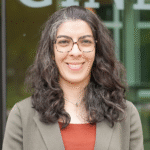 From a young age, Dr. Shelir Ebrahimi knew she wanted to make a meaningful contribution to shaping a better world by educating the next generation of engineers and leaders. As an Assistant Professor in Chemical Engineering and the Experiential Learning Office, Dr. Ebrahimi goes beyond developing students’ technical skills to nurture the whole engineer, shaping creative thinkers who approach problems with ethical reasoning and an understanding of their societal impact. Dr. Ebrahimi empowers students to take ownership of their learning and to build resilience through iterative growth. She fosters inclusive, accessible environments where diverse perspectives can thrive. Students describe her as a “pivotal mentor” whose commitment to authentic experiential learning opportunities, even in the largest first-year Engineering course, demonstrates her commitment to teaching excellence. Dr. Ebrahimi embodies McMaster’s institutional commitment to preparing students to be informed and educated citizens.
From a young age, Dr. Shelir Ebrahimi knew she wanted to make a meaningful contribution to shaping a better world by educating the next generation of engineers and leaders. As an Assistant Professor in Chemical Engineering and the Experiential Learning Office, Dr. Ebrahimi goes beyond developing students’ technical skills to nurture the whole engineer, shaping creative thinkers who approach problems with ethical reasoning and an understanding of their societal impact. Dr. Ebrahimi empowers students to take ownership of their learning and to build resilience through iterative growth. She fosters inclusive, accessible environments where diverse perspectives can thrive. Students describe her as a “pivotal mentor” whose commitment to authentic experiential learning opportunities, even in the largest first-year Engineering course, demonstrates her commitment to teaching excellence. Dr. Ebrahimi embodies McMaster’s institutional commitment to preparing students to be informed and educated citizens.
 Professor Jasdeep Dhir exemplifies the qualities of an exceptional educator, mentor, and leader. As an Assistant Professor in the School of Rehabilitation Science, she has over a decade of teaching experience across the Master of Science and Physiotherapy programs here at McMaster. Her teaching philosophy centers on fostering inclusive learning spaces, promoting critical thinking and clinical reasoning, encouraging self-directed education, and providing experiential learning opportunities. The impact of this philosophy is clear, with one former student describing Professor Dhir as “a tireless advocate for students, a compassionate mentor and an educator who consistently goes above and beyond to ensure her students’ success.” Professor Dhir’s work to foreground equity, diversity, inclusion, and Indigenous reconciliation in healthcare is transforming learning environments at McMaster and the broader educational landscape, contributing to a culture of excellence in education that resonates at local and national levels.
Professor Jasdeep Dhir exemplifies the qualities of an exceptional educator, mentor, and leader. As an Assistant Professor in the School of Rehabilitation Science, she has over a decade of teaching experience across the Master of Science and Physiotherapy programs here at McMaster. Her teaching philosophy centers on fostering inclusive learning spaces, promoting critical thinking and clinical reasoning, encouraging self-directed education, and providing experiential learning opportunities. The impact of this philosophy is clear, with one former student describing Professor Dhir as “a tireless advocate for students, a compassionate mentor and an educator who consistently goes above and beyond to ensure her students’ success.” Professor Dhir’s work to foreground equity, diversity, inclusion, and Indigenous reconciliation in healthcare is transforming learning environments at McMaster and the broader educational landscape, contributing to a culture of excellence in education that resonates at local and national levels.
2024 Winners
 Dr. Bruce Wainman is a Professor in the Department of Pathology and an Associate Member and Adjunct Professor in the Departments of Surgery and Obstetrics and Gynecology. He serves as the Director of the Education Program in Anatomy and the Director of the Surgical Skills Laboratory at McMaster University.
Dr. Bruce Wainman is a Professor in the Department of Pathology and an Associate Member and Adjunct Professor in the Departments of Surgery and Obstetrics and Gynecology. He serves as the Director of the Education Program in Anatomy and the Director of the Surgical Skills Laboratory at McMaster University.
Dr. Wainman has displayed an exceptional ability to engage students, fostering a dynamic and inclusive learning environment. Through innovative teaching methods including incorporating AI and virtual reality learning into curriculum at all levels, he has imparted knowledge and inspired a genuine passion for learning anatomy among students. He has played a pivotal role in advancing education through innovations in evaluation and assessment using technology, and he has been invited to speak around various methodologies to revolutionize course evaluation.
Dr. Wainman’s dedication to advancing education through research endeavors has also provided valuable insights that directly inform and elevate our institution’s teaching practices. His research outputs in the realm of education have garnered recognition within the academic community and beyond. Through these scholarly contributions, he has demonstrated unwavering commitment to not only excelling in the classroom but also pushing the boundaries of educational knowledge.
 Dr. Sean Park is an Assistant Professor in the Division of Education and Innovation, Department of Medicine. He is an instructor in the Integrated Biomedical Engineering and Health Sciences program and is the Co-Director of the Health Improvement and Faculty Innovation Leadership Program with the Health Leadership Academy.
Dr. Sean Park is an Assistant Professor in the Division of Education and Innovation, Department of Medicine. He is an instructor in the Integrated Biomedical Engineering and Health Sciences program and is the Co-Director of the Health Improvement and Faculty Innovation Leadership Program with the Health Leadership Academy.
Since his start as an assistant professor in 2018, Dr. Park has created a host of new experiential, project-based courses in the field of design thinking. Dr. Park has poured a remarkable amount of creative effort into activities, games, tools, course mentors, assignments, and projects that wake-up students’ fullest range of human capabilities for reimagining and redesigning themselves and the world. He has crafted a community-centric pedagogy that helps students to build trusting, safe teams and to develop the respectful, creative confidence needed to work with community members in exploring wicked challenges.
One of Dr. Park’s former students described the impact of his teaching methods: “It is without a doubt that Dr. Park ignited my curiosity and passion for human-centric design. He taught the concepts of design thinking in a way that allowed us to pair the teachings with real-life scenarios… This partnership allowed us to become invested in the learnings and practice the tools and methods in ways that were meaningful to each individual student. Dr. Park approached teaching with a remarkable ability to connect with each of us, showing empathy and presence in every interaction.”
 Dr. Nikol Piskuric is an Associate Professor in the Department of Psychology, Neuroscience & Behaviour. As her colleagues attest, Dr. Piskuric is “an exceptional teacher, utterly devoted to her students, their learning, and their university experience. She is also a generous mentor to countless junior teaching faculty members, providing feedback on their teaching and sharing opportunities to grow and connect with communities of practice. She is a fierce champion for the Faculty of Science on both internal committees and at events aimed at recruiting, supporting, and celebrating our incredible students.”
Dr. Nikol Piskuric is an Associate Professor in the Department of Psychology, Neuroscience & Behaviour. As her colleagues attest, Dr. Piskuric is “an exceptional teacher, utterly devoted to her students, their learning, and their university experience. She is also a generous mentor to countless junior teaching faculty members, providing feedback on their teaching and sharing opportunities to grow and connect with communities of practice. She is a fierce champion for the Faculty of Science on both internal committees and at events aimed at recruiting, supporting, and celebrating our incredible students.”
Dr. Piskuric has championed experiential and community-engaged teaching methods, inspiring her peers to follow suit using her courses and assignments as a model. She has also demonstrated her commitment to continuously improving in her teaching practice, soliciting and applying feedback from students and her peers, engaging in professional development activities, and conducting research on teaching and learning. The impact of this self-reflection and growth mindset is clear: Dr. Piskuric has been recognized by the McMaster Student Union and the Ontario University Student Alliance for her teaching excellence and effectiveness.
A former student writes: “Her commitment to transdisciplinary teaching methods, compassion towards her students, and ability to weave engrossing narratives throughout her course materials make her an exceptional educator and leader in the PNB community. I am immensely grateful for the impact she has had on my education and personal growth.”
2023 Winners
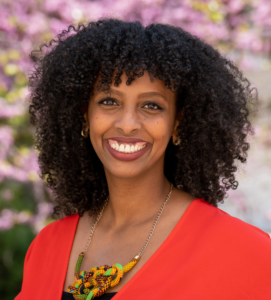 Dr. Alpha Abebe is an Assistant Professor in the Department of Communication Studies & Media Arts and teaches in other programs including Global Peace and Social Justice, and Integrated Business and Humanities. She is a student-centered practitioner with an impeccable record of leadership and innovation in pedagogy and curriculum design, whose contributions extend well beyond her departmental and Faculty communities.
Dr. Alpha Abebe is an Assistant Professor in the Department of Communication Studies & Media Arts and teaches in other programs including Global Peace and Social Justice, and Integrated Business and Humanities. She is a student-centered practitioner with an impeccable record of leadership and innovation in pedagogy and curriculum design, whose contributions extend well beyond her departmental and Faculty communities.
As a Faculty Lead and Instructor for the Humanities Leadership curriculum and the Concurrent Certificate in Leadership, Equity and Social Change, Dr. Abebe worked with leadership in the Faculty of Humanities to build upon the curriculum for the Certificate, including enhancing its focus on equity and establishing partnerships across campus. As a Faculty Lead of the Interdisciplinary Minor in Africa and Black Diaspora Studies (ABLDs), Dr. Abebe built upon the work and legacy of the African Caribbean Faculty Association of McMaster (ACFAM) and established new partnerships to strengthen the program. This included collaborating with Intercession Learning to establish two new core ABLDs courses, and working through the Interdisciplinary Minors Committee to promote the minor across campus. She is also part of a team of ACFAM members who are working to further expand the Minor through development of more prospective courses, hiring and mentoring post-doctoral fellows, and laying the groundwork for an ABLDs Research Institute.
Dr. Abebe is also engaged in a number of service activities focused on enhancing the Black student experience at McMaster. She has supported the launch and expansion of the Black Student Mentorship Program, a mentoring program that provides support and leadership development opportunities to participants, and is an active faculty partner of the Black Student Success Centre.
Nominated by her students for an MSU teaching award in 2022, Dr. Abebe’s approach has been described by her students as “transformative,” with one student noting that her “practices encourage students to question social norms and ways of thinking that can be damaging to equity-seeking groups. Alpha’s approach to teaching empowers students to identify areas for personal growth—and she holds space in the classroom for students to learn as whole people.”
In her time at McMaster, Dr. Abebe has built meaningful relationships with students, faculty and staff across the university community, which will undoubtedly foster the development of greater inclusive excellence in teaching across campus.
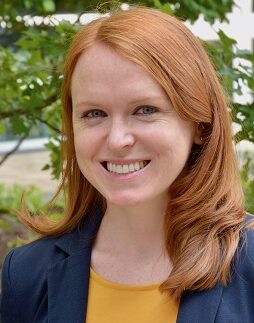 Dr. Caitlin Mullarkey is an Associate Professor and Associate Chair for Undergraduate Education in the Department of Biochemistry and Biomedical Sciences. Through active, student-centered learning, which encourages cooperation between students and faculty, Dr. Mullarkey empowers and immerses students in learning activities that allow them to apply and adapt their knowledge to new scenarios. As a testament to the impact of Dr. Mullarkey’s approach, one student writes, “By transforming knowledge-based courses into highly personalized experiences focused on conceptual understanding and subsequent application, she is effectively fostering the next generation of scientists.”
Dr. Caitlin Mullarkey is an Associate Professor and Associate Chair for Undergraduate Education in the Department of Biochemistry and Biomedical Sciences. Through active, student-centered learning, which encourages cooperation between students and faculty, Dr. Mullarkey empowers and immerses students in learning activities that allow them to apply and adapt their knowledge to new scenarios. As a testament to the impact of Dr. Mullarkey’s approach, one student writes, “By transforming knowledge-based courses into highly personalized experiences focused on conceptual understanding and subsequent application, she is effectively fostering the next generation of scientists.”
Since joining McMaster in 2017, Dr. Mullarkey has demonstrated a consistent commitment to teaching excellence. She collaborated in the development and launch of “DNA Decoded,” a free massive open online course (MOOC) that has enrolled over 34,000 learners globally. Dr. Mullarkey has also developed an open-education resource to support the online delivery of biomedical laboratory courses available through eCampus Ontario. She has secured competitive grants to create new content and delivery methods to support her research activities in the scholarship of teaching and learning. Most recently, Dr. Mullarkey created the Biochemistry Summer Scholar’s Program, a 12-week experiential learning program focused on research skills development, mentorship, and career growth for equity-deserving undergraduate STEM students. She is a two-time recipient of the McMaster Student Union Teaching Award for the Faculty of Health Sciences for her instruction in virology and advanced immunology.
“Dr. Mullarkey is an educator of the highest calibre who has elevated McMaster’s reputation beyond our institutional walls,” writes a colleague. “Her educational leadership and teaching activities have enhanced all five of McMaster’s institutional priorities, and her accomplishments are highly worthy of this [award].”
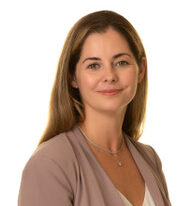 Dr. Elizabeth Hassan is an Assistant Professor in the department of Mechanical Engineering and Experiential Learning Office at McMaster University. Dr. Hassan’s teaching philosophy is built on critical thinking and analysis, building engineering judgement through process, and de-risking failure. Her flexibility, responsiveness and approachability, in addition to effectively using real-life examples to demonstrate engineering practice for the students, has led to positive learning outcomes while reducing student stress levels, and prioritizing mental health.
Dr. Elizabeth Hassan is an Assistant Professor in the department of Mechanical Engineering and Experiential Learning Office at McMaster University. Dr. Hassan’s teaching philosophy is built on critical thinking and analysis, building engineering judgement through process, and de-risking failure. Her flexibility, responsiveness and approachability, in addition to effectively using real-life examples to demonstrate engineering practice for the students, has led to positive learning outcomes while reducing student stress levels, and prioritizing mental health.
In 2022, two groups of engineering students she worked with placed first at the national and international levels of the James Dyson Awards, one of the most prestigious student design competitions in the world. Also, her inclusive approach has been adopted informally by several of her peers, and data from her classes is currently being used to shape Faculty of Engineering level accessible course design policies. Dr. Hassan proactively mentors new junior and sessional faculty, has been asked to advise on experiential teaching approaches at two peer institutions nationally. Also, since taking over the leadership of the departmental recruitment committee, female enrollment in Mechanical Engineering has doubled from 16 to 32%, a truly outstanding accomplishment.
Dr. Hassan’s approach has connected with students. As one student notes, “Being able to participate in a course where we actually get the opportunity to apply what we have learned in a challenging but realistic way taught me a lot about teamwork, project planning, leadership, and most importantly it taught me how to go from the simple idea generation stage to being able to see your ideas come to life.”
 Dr. Karen Balcom is an Associate Professor of History/Gender & Social Justice, and the Academic Co-Director for Teaching and Learning in McMaster’s Office of Community Engagement. She understands the importance of seeing students as individuals and supporting each student’s personal growth alongside their academic development. She engages her students with care and individualized attention, and is committed to accessibility and creating an inclusive learning environment. One student wrote, “her care as a professor in the classroom was phenomenal, but more so, her compassion and care as a human were truly touching.”
Dr. Karen Balcom is an Associate Professor of History/Gender & Social Justice, and the Academic Co-Director for Teaching and Learning in McMaster’s Office of Community Engagement. She understands the importance of seeing students as individuals and supporting each student’s personal growth alongside their academic development. She engages her students with care and individualized attention, and is committed to accessibility and creating an inclusive learning environment. One student wrote, “her care as a professor in the classroom was phenomenal, but more so, her compassion and care as a human were truly touching.”
This deep commitment to her students has meant that, over the years, Dr. Balcom has improved and expanded her teaching practices. Her colleagues write, “the primacy of her concern for her students’ learning drives her to perpetually renew and rethink her curriculum, and to experiment with diverse modes of engagement in terms of content, research and assessment.” Her numerous examples of teaching innovation include developing History’s first archives-immersive experiential course, co-taught with colleagues from the university archives. She is a foundational member of the teaching team for the Integrated Business and Humanities program.
“Dr. Balcom is a pedagogical innovator, a tireless advocate for equity in the classroom and in our larger community, and a generous instructor, supervisor, and colleague. She has had an immeasurable impact on our university, and I know for certain she has transformed many young people’s lives.”
 Dr. Peter Cockett is an Associate Professor in the School of the Arts with a passionate commitment to anti-oppressive, decolonial and social justice pedagogies, and the belief in the power of the arts to engage with and enact social change.
Dr. Peter Cockett is an Associate Professor in the School of the Arts with a passionate commitment to anti-oppressive, decolonial and social justice pedagogies, and the belief in the power of the arts to engage with and enact social change.
Dr. Cockett’s contributions include the development of McMaster’s new Integrated Arts (iArts) programs, and multiple innovative arts-based platforms that connect the decision-making processes behind theatre practice to the social and historical contexts within which theatre is made. Each year Dr. Cockett directs the School of the Arts’ annual Fall Major production and facilitates the School’s festival of student plays – the Honours Performance Series. These productions involve students from the program and across campus in Performance as Research (PaR) projects focused on issues of social justice. He guides these projects from inception through to final production, facilitating the students’ development of their scripts, their sound, lighting, costume and set designs, and the direction of the actors.
In creating the iArts foundational module on Indigenous sovereignty and the arts, he collaborated with local Indigenous artists and undergraduate research assistants, attesting to his care and mentorship of student voices in designing and creating a strong arts program grounded in relational politics and social justice. He has mentored students by involving them in all aspects of performance practice. One student notes, “Peter always fostered inspiration and collaboration while respecting the needs of his students. He would always look to hear our input on the complexities of creating productions and art while encouraging us to step outside of our comfort zones, try new things, and grow as artists. As a theatre artist in the program, he continuously provided mentorship on both theoretical and practical skills and offered outside-the-class opportunities for development.”
His Performance as Research (PaR) work emphasizes playfulness, experimentation, and risk-taking. It encourages students and scholars to trust in process over product, and to seek the happy accidents that surprise, take research in new directions, and open new social possibilities.
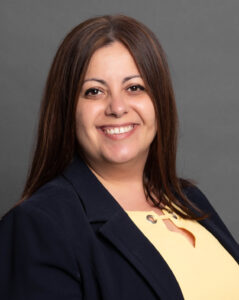 Dr. Rosa da Silva is an Associate Professor and Associate Chair of Undergraduate Studies in the Department of Biology. Dr. da Silva aims to create an active learning environment in her courses that encourages social involvement, inquiry-based learning, and independent study. Employing interdisciplinary and problem-based learning approaches in instruction, she uses case-studies and examples of clinical applications while establishing a safe and inclusive classroom dynamic that encourages and empowers student engagement.
Dr. Rosa da Silva is an Associate Professor and Associate Chair of Undergraduate Studies in the Department of Biology. Dr. da Silva aims to create an active learning environment in her courses that encourages social involvement, inquiry-based learning, and independent study. Employing interdisciplinary and problem-based learning approaches in instruction, she uses case-studies and examples of clinical applications while establishing a safe and inclusive classroom dynamic that encourages and empowers student engagement.
Prof. Da Silva is a recipient of the prestigious 2021 Ontario Confederation of University Faculty Associations Teaching Award (OCUFA). She is a two-time winner of the MSU Innovation Award and, in 2020, was part of a team that received the President’s Award for Outstanding Contributions to Teaching and Learning for the development of Biology’s unique level 1 blended learning course. Dr. da Silva’s colleagues describe her passion, resourcefulness, innovation, mentorship, and collaborative approach to teaching and learning as “infectious and inspiring.” It’s a sentiment echoed by her local and international colleagues who write that Dr. da Silva is truly “transforming science education, and revolutionizing student learning.”
The many innovative initiatives spearheaded by Dr. da Silva include a recent cross institutional collaboration that brought together McMaster biology students and George Brown College game design students to develop ‘Cells at War,’ a choose-your-own-adventure video game in which students learn how body function is coordinated and how its disruption leads to cellular diseases. This collaboration has now extended across disciplines at McMaster and around the world, as part of a large STEAM game-based learning framework. She also revolutionized the undergraduate experiential training opportunities by successfully securing funds to outfit a state-of-the-art cell biology training lab and create the ALLURE lab – a dedicated undergraduate research space.
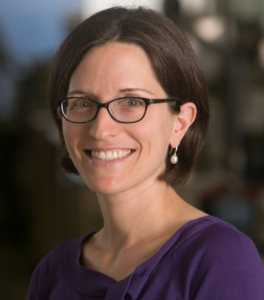 Dr. Sharonna Greenberg, an Assistant Professor in the Department of Chemistry and Chemical Biology (CCB), believes that each student deserves support for their own learning style. She creates the conditions in which understanding and inspiration are possible. This helps her cultivate a curiosity-driven culture of questioning. Her innovations and course designs are based on the idea that continuous feedback is needed to improve student understanding of subject matter and teacher understanding of students.
Dr. Sharonna Greenberg, an Assistant Professor in the Department of Chemistry and Chemical Biology (CCB), believes that each student deserves support for their own learning style. She creates the conditions in which understanding and inspiration are possible. This helps her cultivate a curiosity-driven culture of questioning. Her innovations and course designs are based on the idea that continuous feedback is needed to improve student understanding of subject matter and teacher understanding of students.
While consulting extensively with stakeholders, she redesigned the lab portion of the course for Structure and Reactivity of Organic Molecules into an innovative and meaningful experience. “I loved how flexible assessments were with oral reports, presentations and written textbook reports,” writes one student. “The labs were really well structured overall and it made the transition to second year easier, especially as we become more independent and adventurous.”
Together with colleagues, Dr. Greenberg helped establish the Test Archive & Analysis System (TAAS), which allows instructors to create more predictable assessments, thereby aligning teaching with assessments. She then adapted TAAS to create a digital tool for students so that they do not waste time on questions that are too hard or too easy and, at the same time, are implicitly coached into more effective study habits.
She is applauded by her colleagues for “the type of engaging student experience that I know myself and many of our colleagues strive to achieve. She is at ease, and clearly enjoys her rapport with her students.”
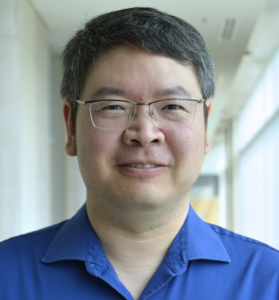 Dr. Zhen Gao, Assistant Professor in the W. Booth School of Engineering Practice & Technology, has been lauded by his peers and students as an engaging instructor, and thoughtful community collaborator, who works to create an equitable, diverse, and inclusive classroom. His teaching approach has been pivotal in helping students develop comprehensive skills, strengthening both their technical and practical competencies.
Dr. Zhen Gao, Assistant Professor in the W. Booth School of Engineering Practice & Technology, has been lauded by his peers and students as an engaging instructor, and thoughtful community collaborator, who works to create an equitable, diverse, and inclusive classroom. His teaching approach has been pivotal in helping students develop comprehensive skills, strengthening both their technical and practical competencies.
Through his teaching, Dr. Gao encourages students to develop independent thinking skills. He uses relevant industry examples and incorporates the latest technology into his labs and course work. As his colleagues note, “Dr. Gao has always been a practitioner of combining engineering knowledge that supports conceptual theory, and practical skills that allow theory to touch the ground.”
Dr. Gao has demonstrated exemplary leadership in teaching and learning innovation. He has developed and redesigned numerous courses and experiments with novel pedagogical strategies. He is one of the founding members of the i-Think initiative, which focuses on building interdisciplinary and integrative thinking competencies for students. As a Program Lead, Dr. Gao continuously strives to enhance the quality of the graduate programs within the W. Booth School of Engineering Practice and Technology and is the founding Program Lead of the Masters of Engineering and Systems Technology, one of the most sought-after graduate programs of its kind.
A list of all award winners can be found in this PDF document: Recipients By Year President’s Award for Outstanding Contributions to Teaching and Learning (1993-2025).

